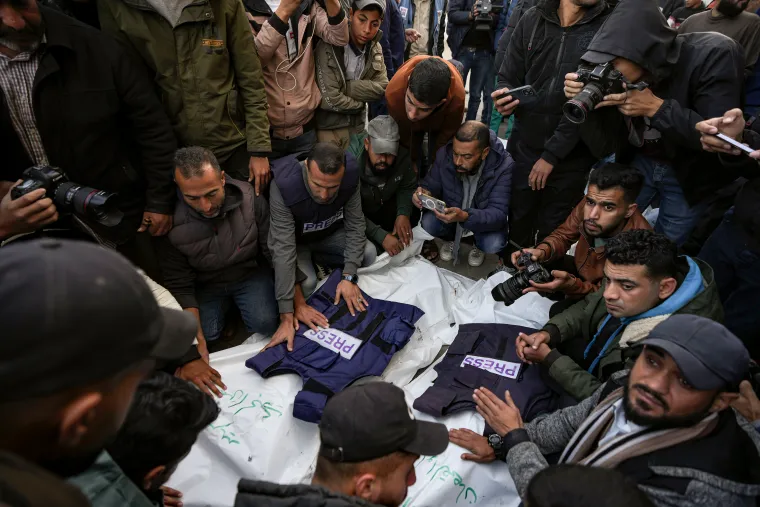2024 marked a grim milestone in the history of journalism, becoming the deadliest year on record for journalists and media workers since the Committee to Protect Journalists (CPJ) began tracking fatalities over three decades ago. A staggering 124 journalists lost their lives across 18 countries, a chilling 22% increase from the previous year. This surge in violence against journalists reflects a disturbing escalation of international conflicts, political instability, and rampant criminality worldwide. The epicenter of this crisis was the devastating Israel-Gaza war, responsible for the overwhelming majority of journalist deaths, accounting for 85 of the 124 fatalities. The Israeli military was identified as the perpetrator in all these cases, with 82 of the victims being Palestinian. This catastrophic loss of life underscores a dangerous erosion of international norms designed to protect journalists in conflict zones. Beyond the Gaza conflict, Sudan and Pakistan each recorded six journalist killings, highlighting the perilous conditions faced by media professionals globally. Sudan’s devastating civil war, which resulted in thousands of deaths and widespread displacement, created a hostile environment for journalists, while Pakistan, which had not recorded any journalist fatalities since 2021, witnessed a resurgence in killings due to escalating political unrest.
The alarming rise in journalist killings is not an isolated phenomenon but rather a symptom of a broader global trend aimed at suppressing the media and silencing dissenting voices. This systematic muzzling of the press represents a profound threat to democratic values and good governance. A free and independent press plays a crucial role in holding power accountable, exposing corruption, and informing the public on critical issues. When journalists are targeted and silenced, society’s ability to address these crucial matters is severely compromised. CPJ’s findings reveal that at least 24 journalists were deliberately murdered in 2024 due to their work. In Gaza and Lebanon, the Israeli military was implicated in 10 targeted killings of journalists, in flagrant violation of international laws that designate journalists as civilians during conflict. Other murders occurred in countries grappling with violence and instability including Haiti, Mexico, Pakistan, Myanmar, Mozambique, India, Iraq, and Sudan, demonstrating the widespread nature of this crisis.
Freelance journalists, who often operate with limited resources and minimal protection, bore the brunt of the violence, accounting for over 35% (43) of all killings. A significant number of these freelance victims, 31, were Palestinians reporting from Gaza, where international media access remains severely restricted. Israel and Egypt continue to impose stringent limitations on reporting from the Occupied Palestinian Territory, generally permitting access only through rare and tightly controlled escorted trips arranged by the Israeli military. CPJ has consistently advocated for greater media access to Gaza and reiterates its call for open access as part of the ongoing ceasefire efforts. The restricted access not only hampers the flow of information but also leaves Palestinian journalists, who are often the sole witnesses to events on the ground, particularly vulnerable to violence and censorship.
The regional breakdown of journalist killings paints a stark picture of the dangers faced by media professionals in different parts of the world. The Middle East and North Africa remained the deadliest region, accounting for more than 78% (97) of global journalist fatalities. The Israel-Gaza war was the primary driver of this grim statistic. Furthermore, Syria, a country with a long and troubling history of impunity for crimes against journalists, witnessed a resurgence in killings after a period of relative calm. Four journalists were killed in Syria amid the political transitions following the toppling of Bashar al-Assad’s regime on December 8th, signaling a return to the dangerous conditions that have plagued the country for years. The resurgence of violence against journalists in Syria underscores the fragility of peace and the persistent threat to media freedom in conflict zones.
In Latin America and the Caribbean, Mexico continued to be a dangerous place for journalists, with five killings recorded in 2024. Despite the existence of mechanisms designed to protect journalists, CPJ’s investigations have revealed persistent flaws and a lack of effective implementation, leaving journalists vulnerable to violence and intimidation. Haiti, plagued by rampant gang violence and a breakdown of law and order, stands out as a particularly dangerous country. Gangs now openly claim responsibility for journalist killings, highlighting the complete erosion of safety and accountability in the country. Two journalists lost their lives in Haiti in 2024, victims of the escalating violence and lawlessness. The situation in both Mexico and Haiti underscores the urgent need for more robust mechanisms to protect journalists and ensure accountability for crimes against the press.
The escalating violence against journalists demands a concerted international response. CPJ has put forth a series of recommendations aimed at improving journalist safety and ensuring accountability for those responsible for attacks on the press. Among these recommendations is the establishment of an international investigative task force specifically focused on crimes against journalists. Such a task force would have the mandate and resources to investigate these complex crimes, gather evidence, and bring perpetrators to justice, regardless of their location or political influence. This international mechanism is crucial for addressing the pervasive culture of impunity that often surrounds attacks on journalists. The alarming trend of increasing violence against journalists continued into 2025, with at least six journalists and media workers killed in the first weeks of the year, underscoring the urgent need for action to protect the press and uphold the fundamental right to freedom of expression. The safety of journalists is not just a concern for the media; it is a fundamental prerequisite for a functioning democracy and an informed society.


